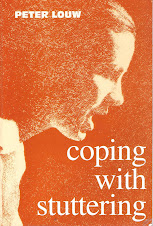 |
| Above: An example of a non-Evidence-Based Practice |
In speech therapy circles, some therapists / pathologists insist on ‘evidence-based practice’ (EBP) when discussing the various therapies for stuttering. EBP, then, is supposed to be a ‘serious’ therapy based on hard scientific evidence as to its efficacy, in contrast with the many ‘non-scientific’ stuttering treatments available.
The insistence on EBP in speech therapy has always worried me. Of course, as a general concept in the exact sciences it is certainly a praiseworthy quest, as it doesn’t make sense to propagate either a theory or a therapy if it is not backed up by hard evidence and concrete facts. The fundamental question, however, is whether stuttering therapy is an exact science.
It seems to me that stuttering therapy is not an exact science. Stuttering is not just a physical phenomenon. It also entails less definable areas such as psychology and stress. Where psychology and stress are also involved, things can become hazy, vague, even more complex and difficult to prove.
The 'stuttering subconscious'
For example: in the literature on stuttering there is a hypothesis that relapse occurs as a result of the ‘stuttering subconscious’. According to this hypothesis, the person who has been stuttering for some years acquires the subconscious and the self-image of a ‘stutterer’. When such a person is taught a fluency technique and acquires some fluency, the stuttering subconscious becomes ‘worried’. The stuttering subconscious is accustomed to disfluency, and any change to the status quo is regarded as a ‘threat’. This conflict results in increased stress levels, which of course leads to more stuttering and a full-blown relapse. In this way the subconscious is assuaged – the status quo is maintained, the individual continues to stutter and his self-image as a stutterer remains intact.
This hypothesis makes a lot of sense to me, and certainly corresponds with my own experiences as a person who stutters. I am convinced that the stuttering subconscious is a major cause of relapses in stuttering, and that it is a huge obstacle on the difficult road to better fluency. But how can the existence of the stuttering subconscious be proved? And if there are strategies for dealing with the stuttering subconscious, how can it be proved that they work, and that any improvement is not due to some other factor not related to the subconscious?
It seems to me that over-emphasising EBP in stuttering reflects a limited view of stuttering and its treatment. If EBP is a criterion in stuttering, the ‘stuttering subconscious’ would simply be ignored by therapists, as evidence for it is hard to obtain. In the same way it is difficult to prove the existence of Jung’s ‘collective subconscious’ and many other psychological theories. Yet many of these theories seem to be valid for a lot of people.
In conclusion – EBP has its limitations in stuttering. That, of course, is not to say that evidence in itself is of no use in stuttering research and therapy. Evidence, and the scientific quest for objective truth, naturally have a place also in stuttering – as long as one keeps in mind that stuttering lies in the grey area between the exact sciences and the not-so-exact sciences of psychology and stress studies.






Part of the reason why EBP has entered speech therapy (as it has in a lot of therapies) is because without it they wouldn't get funded. Contemporary patients have come to expect EBP as part of standard medical procedure, if it weren't for objective analysis and EPB we'd still be following Wendell Johnson's unsubstantiated 'learned theory' of stuttering!
ReplyDeleteTom, I agree that EBP has its benefits, but also major drawbacks. Unfortunately it's part of the "medical" model of stuttering which to my mind is totally inappropriate for stuttering - because it does not allow for psychological approaches to stuttering. In particular it doesn't allow for "mind-body" approaches, whereas it seems clear to me that stuttering is just such a mindbody disorder just like spastic colon, reflux, certain stress-related skin issues such as acne, etc etc - the list is long. Feel free to join my "Stuttering as a mindbody disorder" Facebook group!
Delete